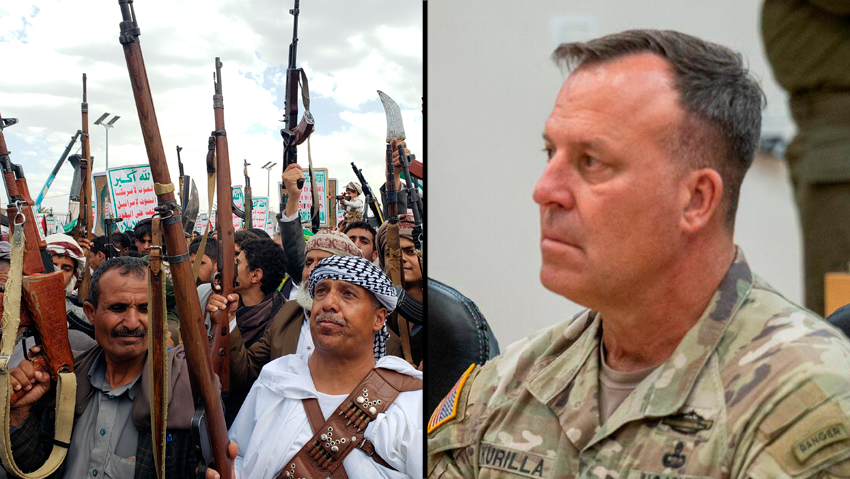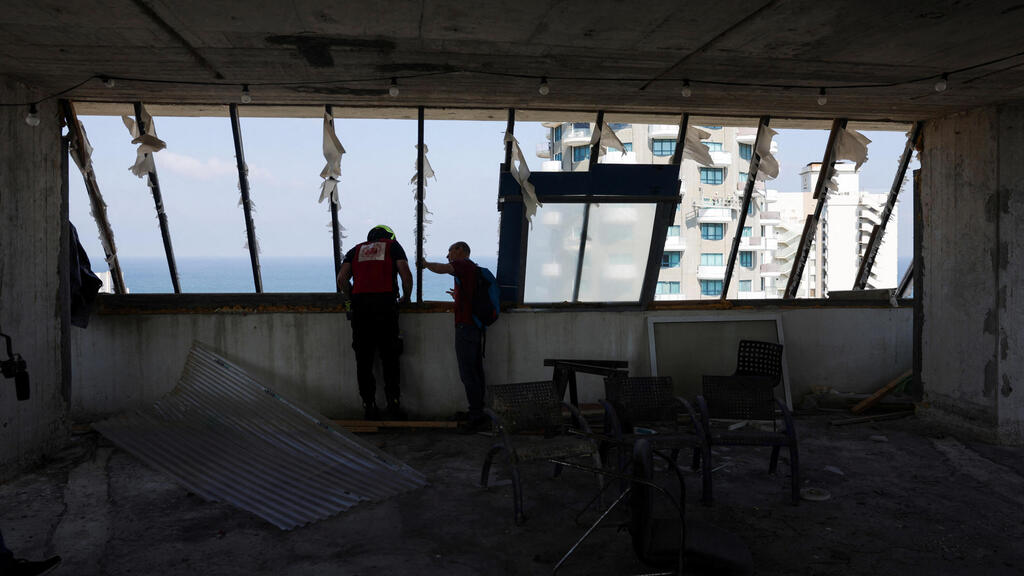Getting your Trinity Audio player ready...
U.S. intelligence agencies have warned that Russia might participate in arming the Houthi rebels in Yemen with antiship missiles in retaliation for the Biden administration's support for Ukrainian attacks on Russian territory with U.S. weapons, the Wall Street Journal reported on Friday.
According to the report, this concern comes in the wake of a classified letter in which U.S. Central Command (CENTCOM) commander General Michael “Erik” Kurilla warned U.S. Defense Secretary Lloyd Austin that current U.S. military operations in the region are "failing" to deter the Houthis' attacks on shipping in the Red Sea. He recommended, according to U.S. officials, a "broader" approach.
3 View gallery


U.S. Central Command (CENTCOM) commander General Michael “Erik” Kurilla warned that U.S. failing to deter Houthi attacks in Red Sea
(Photos: Yahya Arhab/EPA,IDF spokesperson's unit)
Kurilla wrote in his letter that the entire administration must increase the effort against the Houthis: economically, diplomatically and militarily.
“Many people found the tone of the memo to be a bit shocking,” a defense official said. It said essentially that “U.S. service members will die if we continue going this way.”
The White House is working on a diplomatic effort to prevent Moscow from transferring weapons to Yemen by using a third country to convince President Vladimir Putin not to join Iran in supplying weapons to the Houthis. According to the newspaper, the combination of intelligence that Moscow might be planning to provide military support to Yemen and the warnings from Kurilla has raised the question of whether the White House is doing enough to halt their attacks in the Red Sea and elsewhere, as evidenced by the drone strike overnight between Thursday and Friday in Tel Aviv.
According to a source in the US administration, the US Central Command has already been asked to prepare a "broad list of potential targets", including specific terrorists, for possible strikes on them. Even so, some U.S. officials said it would have been possible to hit the Houthis more significantly - and better protect the ships they attack almost daily. According to the sources cited in the Wall Street Journal, it was possible, for example, to hit other targets including larger weapons storage facilities, the leaders of the Houthis - or targets where the potential for casualties is higher.
The White House authorized the US military to attack Houthi targets - missiles and UAVs - before they are launched, and has taken other "limited steps," including seven planned military operations, according to the report. Another security source in the US defended this policy, and claimed that the U.S. and its allies destroyed "a significant amount of Houthi capability," including hundreds of missiles and launchers, hundreds of attack drones, dozens of weapons and equipment storage facilities and several command and control facilities, air defense systems, radars and helicopters.
3 View gallery


Russian President Vladimir Putin warned that Moscow could supply weapons to U.S. enemies because of the White House's Ukraine policy
(Photos: Valentina Pevtsova/EPA, Sputnik/Kremlin Pool )
Even so, U.S. Central Command officials said their forces could not prevent the Houthis from hitting ships in the Red Sea or the Bab al-Mandab strait, since they had not received approval for large-scale attacks. “If you tell the military to re-establish freedom of navigation and then you tell them to only be defensive, it isn’t going to work,” said one U.S. official. “It is all about protecting ships without affecting the root cause.”
Fears about the transfer of Russian missiles to the Houthis increased last month when Russian President Vladimir Putin warned that Moscow could supply weapons to U.S. enemies because of the White House's policy regarding Ukraine. “The response can be asymmetrical, and we will think about that,” Putin told journalists at an international economic forum in St. Petersburg, Russia.
Missiles have not been transferred since then, but, according to American sources, representatives from the Houthis have already been seen in Russia. Meanwhile, the missiles could be transferred, according to the report, through the Iran's smuggling routes.
Yevgeny Perder, 50, from Tel Aviv, was killed in the drone attack. Following the fatal drone strike, Prime Minister Benjamin Netanyahu held a telephone security consultation. The possibility of Israeli military action in Yemen is being considered for the first time since the war began.
3 View gallery


Damage from Houthi drone attack on apartment building in Tel Aviv
(Photo: Ricardo Moraes/Reuters)
Israeli officials told Ynet that "Israel will respond to the Houthi drone strike. The option of an attack on Yemeni soil is on the table and we cannot rule out a response in Yemen." The assessment in Israel is that the target of the attack was the U.S. Embassy. "It is being investigated, but it seems that it was not by chance. It was probably their target," they added. An Israeli source told the Saudi network "Al-Hadath": "We will investigate Iran's involvement in launching the drone"
The US Embassy in Israel said in a statement that: "We are aware of the UAV attack for which the Houthis claimed responsibility. There was no damage to the U.S. Embassy building. We have no reports of injuries to U.S. personnel or our local personnel. We are in close contact with the Israeli authorities to fully investigate the source of the explosion and its intended target."
The U.S. Ambassador in Israel Jack Lew tweeted "Shocked by the brazen Houthi drone attack in Tel Aviv this morning. We offer our condolences to the family members of the individual who passed away. We are thankful our U.S. Embassy Branch Office personnel are all safe."

